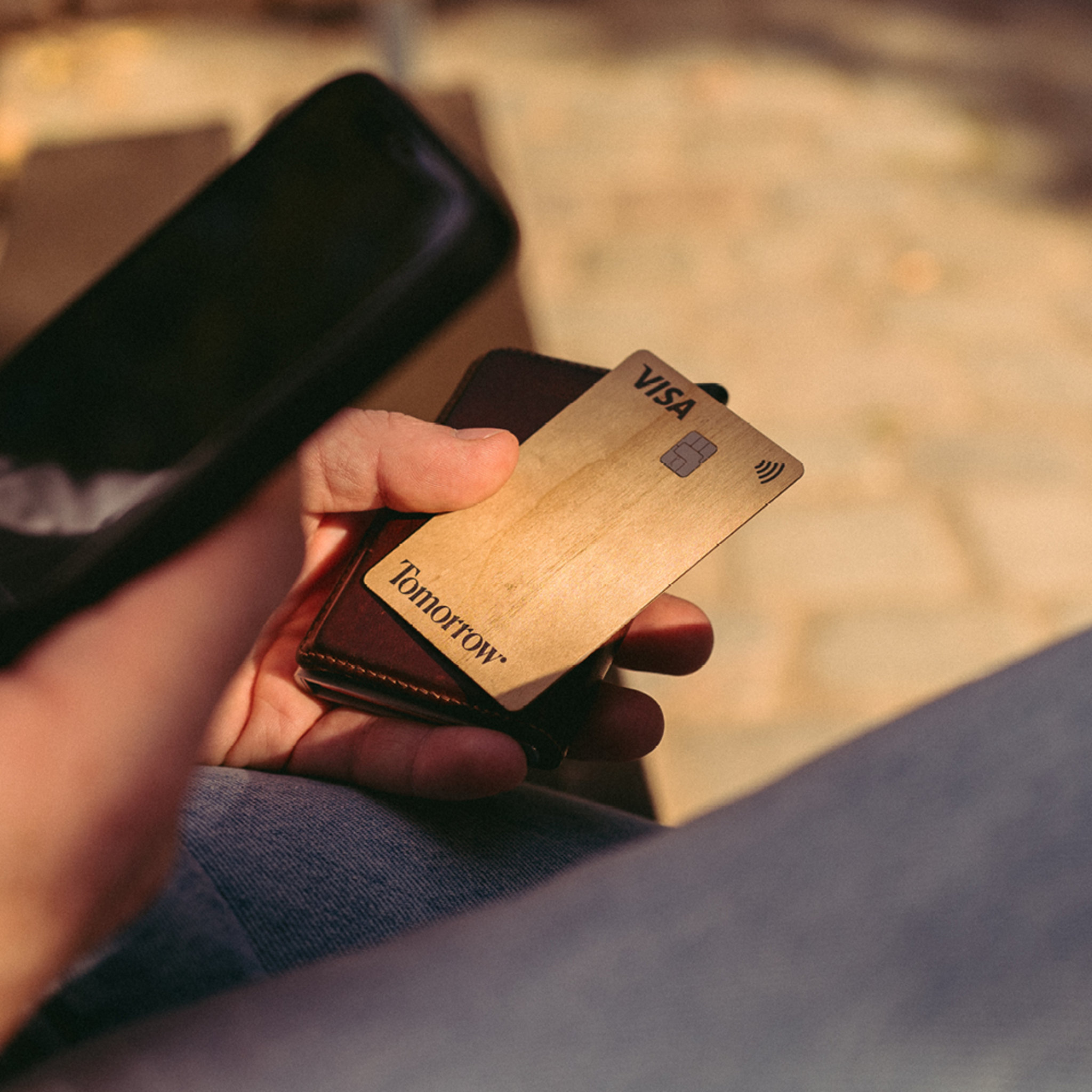
Your premium account with extra climate protection
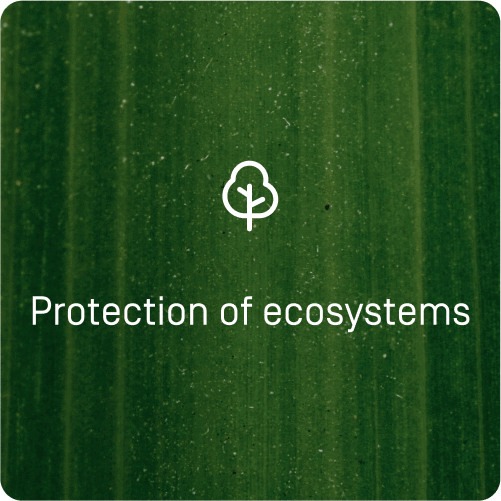
It’s time for a premium account with extra climate protection.
Through support of impact projects in three important areas:
You protect ecosystems in South Africa with long-term renaturation of healthy habitats. Learn more about it here.
You enable new CO2 storage facilities by supporting innovative technologies.
You support important work on a climate political level to get green energy and other sustainable technologies off the ground.
Wood is the new good.
Our wooden card stands for a new way of looking at money and consumption. Included in Zero.
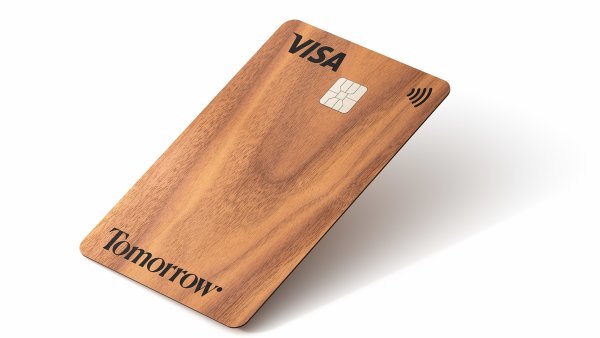
Tomorrow Zero is for people who want more.
For their banking and the planet.
Unlimited free withdrawals
Deposit cash
Unlimited Pockets
Shared account
CO₂ savings
Insights
Pay globally
Mobile payments
National deposit insurance
Climate protection
Impact Board
Manage your money with ease.
Save your money in unlimited Pockets and reach your financial goals quicker.
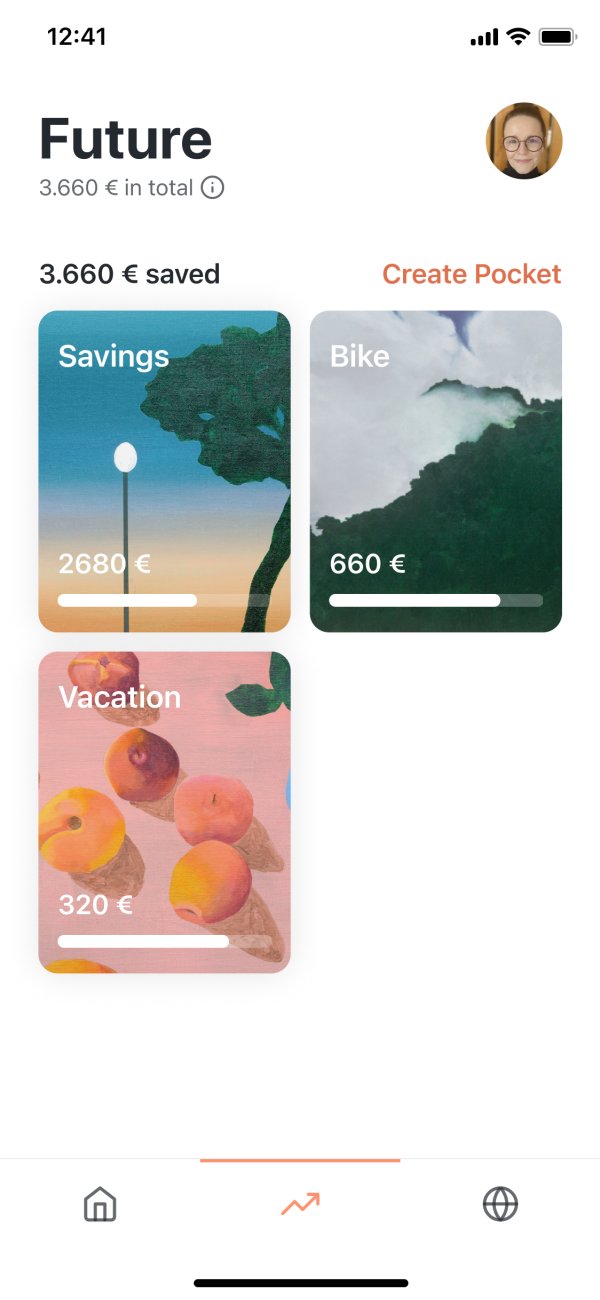
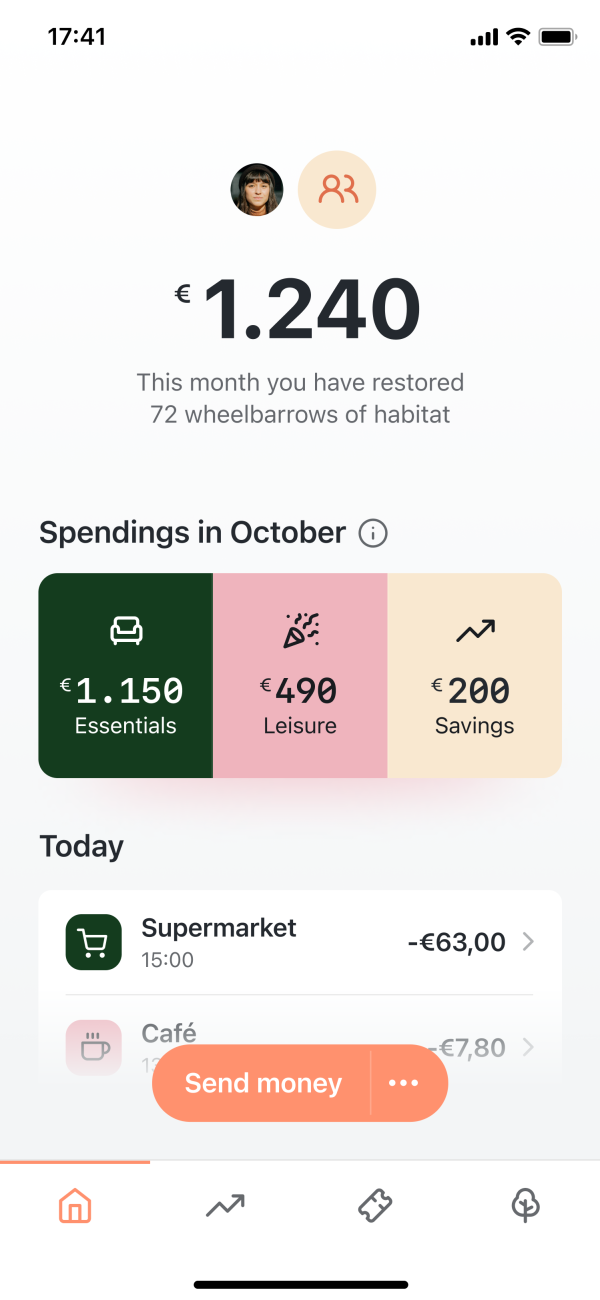
Manage your finances together.
Invite your +1 with just four taps to your shared account. Both of you get an additional debit card with IBAN to easily switch between accounts. With Tomorrow Zero this feature is free for you - the other person also need a Tomorrow account.
Every month, you ensure that CO₂ is saved in the future.
With a share of the account fees, together as a zero community we finance all-embracing solutions to combat the climate crisis.
We will be working primarily with the following projects and organizations over the next few months:

Spekboom in South Africa - Protection of ecosystems
As a Zero community we are supporting the restoring of the original habitat in the global south, to strengthen the biodiversity and to absorb CO₂ from the atmosphere.
The Eastern Cape landscape has dried out due to intensive agriculture and long periods of drought. To transform these areas into healthy land again we plant seedlings of a native succulent. The project aims to create several biodiversity and wildlife corridors to restore the original habitat and biodiversity in the area.
Spekboom (Portulacaria afra) aka elephant bush is a small succulent tree that is native to the Eastern Cape region of South Africa. Common to semi-arid thickets, it is a resilient plant that is remarkably tolerant of drought conditions and rocky soils. It can grow up to 5 meters tall, creating a micro climate that is conducive to biodiversity restoration. Its roots are soil binding which prevents soil erosion, and its leaves help regenerate soils due to their nutritive content.
The location of the Spekboom Restoration South Africa is a 1,456-hectare farm within the plant’s native range in South Africa’s Eastern Cape region. This farm largely consists of degraded grazing lands with a smaller portion of low productivity agricultural lands situated around the upper reaches of the New Year’s River, which flows through the property.
The area consists of approximately 1,200 ha of land suitable for the planting and restoration with native Spekboom, representing 3 million trees of new plantings during a two-year planting schedule, followed by three years of maintenance. At that time, the spekboom plants will be well-established, and in the following years the landscape will be restored into a biodiverse thicket ecosystem placed in permanent protection for conservation purposes. Continued monitoring and reporting occur, and periodic verifications of the GHG emission removals.
In addition to the ecological aspects, the project also has a social impact. Up to 110 seasonal jobs and another 5 full-time jobs have been created in an area with an unemployment rate of more than 75 % in 2023.

Carbon Collectors - Innovative technologies
As the Zero community, we are supporting a regional vegetable carbon project that can be used to absorb CO2 from the atmosphere and bind it in the soil in the long term.
To ensure we meet the target of 1.5 degrees in Germany too, we need to make use of many different levers when dealing with our CO2 emissions. One of these is supporting innovative technologies for binding unavoidable CO2 emissions. This is exactly the approach taken by Carbon Collectors’ regional project in Northern Germany. Through a special procedure, CO2 is stored in the long term in the form of vegetable carbon and introduced to the soil as a source of moisture and nutrients. This allows CO2 to be removed from the atmosphere. The first facility for climate farming and regenerative agriculture is based in Lüneburger Heide, about 30 minutes south of Hamburg and will be taken into service at the beginning of 2024. Here, vegetable carbon is added to the soil on a space measuring 10-20 hectares.
The technique used to produce vegetable carbon on the model farm is called pyrolysis. Here, vegetable carbon is produced out of organic waste – such as wood or plant cuttings – by ‘baking’ the organic biomass in low-oxygen environments at temperatures of between 380°C and 1,000°C. As a result of this process, a part of the carbon turns to vegetable carbon. The energy needed for this is met by carbonising the waste material. The process generates heat, so that fossil energies can be replaced. Once in the soil, the bulk of the carbon contained in the vegetable carbon will then be stored over thousands of years.
As well as the climate effect, the vegetable carbon improves the soil and allows a layer of humus to form, which is able to store water and nutrients effectively. This in turn helps to create a healthy habitat for microorganisms that reduces nitrate pollution and soil acidification. Vegetable carbon therefore has a positive effect on soil quality and, in addition to its important function as a natural binding agent for CO2, can help to make agriculture more resilient when it is added to arable land.
This is the first regionally concentrated climate project to be supported by the Tomorrow community. One tonne of vegetable carbon can bind 2.57 tonnes of CO2 after the deduction of the emissions that are generated during the process.

Clean Air Taskforce - Political change
As the Zero community, we are supporting important work at climate-policy level that aims to promote green energies and other sustainable technologies and, in turn, to reduce greenhouse gas emissions.
To counter the climate crisis resolutely, it is necessary to drastically reduce greenhouse gas emissions worldwide. This means focusing in particular on the main perpetrators. These include the global energy sector, which accounts for some 70% of emissions – with demand for energy continuing to grow. Globally active charity organisation Clean Air Task Force works to meet this challenge on an ecological, financial and even social level.
The organisation, which is active across the globe and has offices in Boston, Washington D.C., and Brussels, is one of the pioneers of the global environmental and climate movement. Since the 1990s, it has been working to bring about political and technological change, which in turn will help to reduce the CO₂ emissions caused by electricity generation, fossil energies, transport and industry. Or, in a nutshell: to decarbonise business. It does this by carrying out fact and science-based political educational work, running large-scale campaigns and initiating studies. Here, the focus is always on finding solutions.
The organisation aims to bring about a number of things: A common knowledge base with a view to helping people understand the climate crisis facing us all and to establishing a scope of action against it. A change in technologies, to make the entire range of carbon-free options – such as advanced renewable energies, zero-carbon fuels and advanced geothermal energies – available at affordable costs. A change in business models in order to offer modular, producible energy solutions that can be used quickly anywhere. And a change in policymaking to improve the political conditions for promoting new technologies and systems and to keep the aim of reaching zero net emissions by the middle of the century realistic. After all, the best climate models all agree: carbon capture technologies will be of decisive importance for reducing emissions from industrial plants and from the atmosphere.
The Zero community wants to support Clean Air Task Force’s efforts in Europe. Specifically, we want to help it in its work for an EU-wide policy for reducing methane emissions from the oil and gas sector and switching to a more environmentally friendly energy system in Europe.
Customers who have signed up for an account before 09.08.2022 and have not yet switched to the new Zero Climate Contribution will continue to support the following projects until the end of march 2023:

Access to clean drinking water in Eritrea
Two billion people around the world have no access to clean drinking water. In sub-Saharan Africa, contaminated water is one of the leading causes of death. Accordingly, people often have no other choice than to purify water by boiling it on an open fire using the simplest means. This releases CO₂ and leads to sections of forests being cut down for firewood, which in turn exacerbates the problems in these areas. The heavy smoke that develops when the water is boiled then leads to respiratory diseases, especially among women and children.
The project that we are now supporting in Eritrea helps communities to repair wells and avoid emissions. Every year, the project allows a total of 70,000 tonnes of CO₂ to be sequestered. Over 300 wells have already been repaired to date, providing 30,000 households with water. We are continuing this mission with a view to ensuring long-term access to clean drinking water that does not need to be boiled first. Cutting down fewer trees not only lowers our global CO₂ emissions but also reduces local soil erosion and desertification.
Every month, Tomorrow purchases from the active projects the exact amount of CO₂ certificates needed to offset CO₂ for its active Zero users. Savings to date reflect the CO₂ certificates purchased so far in connection with this project, which currently accounts for 40% of the emissions offset by Zero.

Protect rainforest together with small farmers in Peru
Tampobata is located in the southeast of Peru. It’s an enormous, breathtakingly beautiful part of the Amazon. The area consisting of jungle, wet savannas, rivers and lakes is the habit of uncountable animal and plant species. For our climate the tropical rainforest is of invaluable importance because it stores enormous amounts of CO₂. Unfortunately, the Peruvian rainforest is under great threat. An ever-increasing area is chopped down and destroyed in the search of gold.
To protect the rainforest this project supports 400 local families. The small farmers are entrusted with the lands, for example to harvest Brazil nuts. Bertholletia excelsa trees can grow up to 60 meter tall and have always been part of the forest.
In addition, those farmers receive microcredits and learn how to process and sell the nuts. This way they can build a livelihood that does not depend on chopping down the woods.
Every month we buy exactly as many CO₂ certificates as are necessary to compensate for the carbon footprints of all active Zero users. This means that the carbon savings reflect the number of certificates that we have bought so far from this project. Currently, we offset 60% of our users’ emissions through this project.

Supporting worldwide access to clean drinking water
Two billion people worldwide have no access to clean and fresh drinking water. In African sub-saharan countries contaminated water is one of the main causes of death. To protect themselves the water needs to be sterilized, and many people have no other possibility than boil it over open fire. This releases carbon dioxide. The smoke of the fire causes airway diseases, especially among women and children.
The project "Improved Kitchen Regimes" aims to avoid these emissions. Therefore, they build and maintain wells in Uganda giving people access to clean drinking water without the need of boiling the water before drinking. At other locations, the project supplies efficient stoves that need less wood and, therefore, release less carbon. That’s good for the climate and the health of the people.
Every month we buy exactly as many CO₂ certificates as are necessary to compensate for the carbon footprints of all active Zero users. This means that the carbon savings reflect the number of certificates that we have bought so far from this project. Currently, we offset 50% of our users’ emissions through this project.
This project has been stopped in July 2021.

Biogas units in Vietnam
In Vietnam many people still cook on wood or coal stoves. This causes climate-damaging emissions. A clean alternative are small biogas units which families can use at home to transform organic waste like dung into energy. In airtight units the waste ferments into biogas which can be used for firing a stove. Or lighting a gas lamp.
Thanks to the units biomass does not rot in the open air, which would release methane. That’s good for the climate, too. As a byproduct the units produce organic fertilizer which is cheaper and better for the ground than synthetic stuff.
Finally, the project improves the physical and social situation of these people as they get access to clean and affordable energy.
This project has been fully financed in November 2020.
Download the Tomorrow App now and open a sustainable account in just a few minutes.
¹ This protection applies per customer / per bank - in this case Solaris. In case you have several accounts with Solaris, the deposit protection applies to all your accounts in total. This corresponds to the standard for all European credit institutions.
Note: Our partner Solaris SE is the provider of all banking services. Additionally Tomorrow GmbH offers the brokerage of the above-mentioned investment product as a tied agent within the meaning of § 3 para 2 WpIG in the name and for the account of lemon.markets brokerage GmbH and is entered in the public register maintained by the German Federal Financial Supervisory Authority (BaFin). The register can be viewed at https://portal.mvp.bafin.de/database/VGVInfo/vermittlerSucheForm.do .

